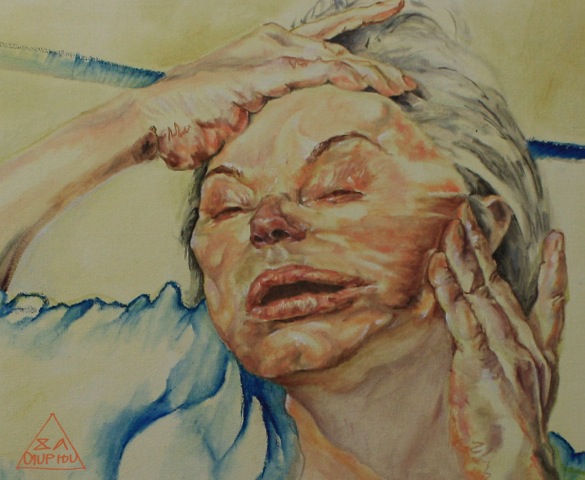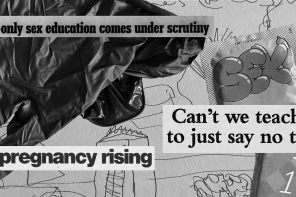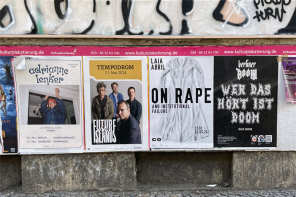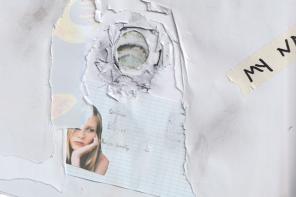We must impress in our minds: Freedom does not exist. I have never understood the people who pursue Freedom like dogs chasing a mechanical rabbit at a race; ‘mechanical’ here is the keyword, because this contest that begins with the construction of social awareness (and all that this leads to) has become completely regulated. The exercise of thinking about Freedom and conceptualizing it with clear frontiers is a paradox. Furthermore, the one claiming to know Freedom is the first big liar, because they create a film in their head in which the opening credits begin with an image that is believed in, but irrelevant to the collective imagination.
However, it is reasonable to analyze the conceptualizations individuals portray of this image. Perhaps the best way to achieve this is by comparing the action and its verbalization, as the distance between both (already regulating our bodies) is exactly the ‘designed’ Freedom that a person has given themselves up to. This differentiation between social practice and verbalization is not a new topic: the theory/praxis dichotomy has been widely discussed. From a young age we are taught to follow rules called ‘Morality’, with that majestic capital letter inspiring respect. The problem arises when we discover that complying with these rules in the community is an epic task no one has achieved, only because the process of ‘civilizing’ oneself entails the practice of an economy based on self-control.
In her poem Romance a la Encarnación, Juana Ines de la Cruz starts by stating:
‘…Por obediencia del Padre se vistió de carne el Verbo, mas tal, que le pudo hacer comodidad el precepto.’
While being educated in the idea of morality, we dress up the Word into flesh. By dressing the word into flesh, I am referring to the possibility of harmonizing our action to its explanation, so I call it the Verb instead of the Word. The way we explain our deeds becomes our own design of freedom. Therefore, the outerwear we use to clothe the Verb undresses our interpretations of Freedom, and our bodies become the result of a collision between the verbalization of social regulation, surveillance from others, and our own modes of resistance to it. When, as Attali explains, the individual begins to enjoy the submission to a rule, then coercion is no longer necessary. However, submission is only possible at the moment we harmonize action and explanation.
The synchronization of action and explanation condenses in our bodies, as they have become the best representation of our understanding of Freedom: this separation between Freedom and representation of it is only an intellectual slip I allow myself in order to clearly express my ideas, but when it comes to being precise we should declare that it is impossible to think of Freedom as a predecessor of the body, or the body as an outcome of Freedom; Freedom is the body, and this is perhaps the strangest synonymy for analysis.
However, our bodies are not capable of heroic feats. Instead, they do not withstand the various forms of oppression within which we live. They adapt to these conditions by becoming submissive or by altering their boundaries in a dynamic way because coercion is subtle, but flagrant at all times—and even the idea of ‘time’ should be capitalized as it is already regulated and fractionated to be understood in certain manner.
/Today I used a jacket to hide my homosexuality to others in a subtle but powerful way./
My clothes are read as holding a distinctive role in the community, but the Verb (the effort of harmonization) my clothes ask others to read, or the way I explain my actions, can sometimes take place far away from my body and its (re)actions, that my conception of freedom becomes blurred. Here I must make a judgment: the closer the action is to the Verb, the more the individual approaches his structured idea of Freedom. The pink elephant in the room is, to the disappointment of those who keep trying to build great systems of belief, that there are as many forms of freedom as there are human beings. Anyone who claims the contrary is the second big liar.
When Sor Juana states that the Word became flesh by mandate of the Father, we must not forget why this command is reassuring. Perhaps the way my body consents to forms of social subjectivity is a quest for survival against a social framework that seeks the homogenization of categories that falsely symbolize what plurality is about. Thus, our bodies become instruments that play roles governed by external rules, indicating how we must act and react. The heroic action is perhaps nothing more than my body’s consent and passive acceptance, until the moment when resistance to these systems of belief leave enough space for reform. We have reached such a level of submission that comfort is now our heroic action.
‘Conveniencia fue de todos este divino misterio, pues el hombre, de fortuna, y Dios mejoro de asiento (…) A estrecha cárcel reduce de su grandeza lo inmenso, y en breve morada cabe quien solo cabe en si mesmo.’
By supporting resistance, we make sure that the impossibility of static identities stays in our minds, even though some say the contrary. Then, different forms of resistance and their responses (some positive some negative, but both productive) become part of a game in which the winner will be the one who has stood up against the fighter using its own rules, the one who has managed to perform at a time when the repertoire prescribed otherwise. However, the know-how seems like a huge task and we often forget what we were playing.
One cannot overlook how groups inside human-rights movements have deconstructed individual identity forms in order to homogenize, and thus have resigned a diverse construction of themselves. These strategies of homogenization only re-produce performances (performative requirements) that can be as destructive as those erected within the heteronormative matrix. The body that seemed resistant is then integrated inside a game in which power and institutionalized knowledge changes (sometimes drastically) its potential to perform in an innovative way.
/Let’s institutionalize the membership to an organization that is supposed to protect our rights the same way the vagina has been institutionalized by Medicine: and so shall everyone be born equal and Free, with capital F./
The question does not lie in what is exactly our idea of Freedom (with that massive capital letter that prevents us from seeing what is behind). The question is how to move the action and its verbalization closer, so that we are able to understand our own design of the concept without feeling the fracture that some organizations have been trying to repair as if filling a hole in the wall with caulk. Perhaps the question is how to make the caulk between word and act soft enough for the filled fissure to eventually collapse on its foundations. The edge seems so diffuse that it is terrifying, but finding ourselves rearticulating conceptual relations previously classified as ‘abnormal’ is to blur the outline of the concept—at least until the practice ceases to be revolutionary by the absence of ‘normalcy’. Let’s destroy that horrible concept of Freedom, or at least let’s remember that Freedom comes with endless vigilance.
Words by Ignacio
Edited by Louise Trueheart
Visuals by Zoe Alexandra Ciupitu








